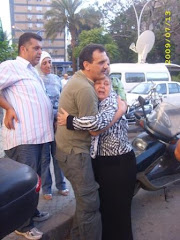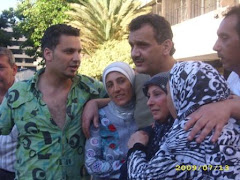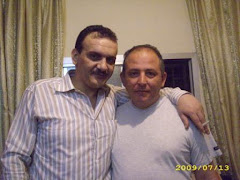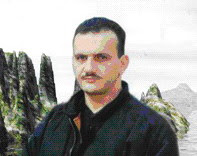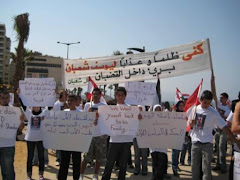Speech of Wadih Al Asmar, Secretary General of the CLDH (Lebanese Center for Human Rights), on the occasion of the press conference held this Friday October 19, 2007, entitled:
WHY DOES THE LEBANESE JUDICIARY CONTINUE TO COVER UP RUSTOM GHAZALEH’S CRIMES?
Let me begin, on behalf of the Lebanese Center for Human Rights, by thanking you all for being here today. I particularly would like to emphasize the key role that the media play in contributing their support to our struggle for a greater respect for human rights in Lebanon.
We have invited you here today to this press conference in order to share with you our assessment of the lobbying and awareness campaign that we have conducted with the goal of drawing the attention of the political an d judicial authorities, as well as the religious ones, to the tragic situation of Youssef Chaabane. Mr. Chaabane has been detained for more than 14 years on the basis of a court judgment that violates Lebanon’s international commitments.
The opinion of the United Nations Working Group on Arbitrary Detention in this matter is a sign of the mistrust expressed vis-à-vis the Lebanese justice system in its totality. The experts of the United Nations were very explicit when they qualified the detention of Youssef Chaabane as “arbitrary”. The Working Group believes that: “to be sentenced to death, even when the sentence is commuted to a life term, while denying the concerned individual to have the conviction and the sentence reviewed by a higher jurisdiction, is in itself a very serious violation of the norms of a fair trial.”
The Working Group believes (…) that the violation of Paragraph 5 of Article 14 of the International Covenant on Civil and Political Rights – to which Lebanon is a party – is of such an egregious nature that it confers upon the detention and conviction of Mr. Chaabane an arbitrary character.”
Following this campaign, there is a lingering feeling of a profound malaise, since we have come to the unpleasant conclusion that since April 2005, when the Syrian forces withdrew, nothing has changed in Lebanon. How else should one interpret the dogged stubbornness of an entire judiciary to protect a decision made following an unfair trial which itself began with an illegal arrest and detention at the Syrian Intelligence Center in Beau Rivage, and following an investigation conducted under the aegis of Rustom Ghazaleh himself?
Does Mr. Ghazaleh’s ghost continue to haunt the Justice Palace? Or are some people so afraid of what Mr. Ghazaleh could reveal of their past that they thus continue to tread carefully around him?
Lebanon has paid too dear a price in getting rid of the Syrian occupation that we cannot accept that crimes and judicial errors committed during that period go unpunished.
Many arguments can be, and have been, put forth by eminent and respected legal experts that it is impossible to re-open the case of Youssef Chaabane because he was tried before the Judicial Council and the decisions of the Council may not be appealed. We, however, would like to remind the experts that:
The Lebanese Constitution gives precedence to Lebanon’s international commitments over Lebanese law, and therefore nothing prevents the experts fro m relying on the International Covenant on Civil and Political Rights to set up an appeals process for judgments issued by the Judicial Council, by simply adopting a positive interpretation of the law without recourse to Parliament.
Another trial took place in Jordan in 2000 on the same case, and at no time did that trial implicate Youssef Chaabane. This constitutes an exceptional factor that should prompt them to review the case. The question is not whether or not to put more credence in Jordanian justice; rather, it is basic common sense that should compel the Lebanese judiciary to immediately request from the Jordanian authorities to transmit those evidentiary elements that allowed them to make a decision and then review Youssef Chaabane’s trial in light of those elements.
Rustom Ghazaleh is no longer in Lebanon. The fact that he was directly or indirectly involved in the trial should be reason enough to repeal the trial.
The Lebanese Constitution gives precedence to Lebanon’s international commitments over Lebanese law, and therefore nothing prevents the experts fro m relying on the International Covenant on Civil and Political Rights to set up an appeals process for judgments issued by the Judicial Council, by simply adopting a positive interpretation of the law without recourse to Parliament.
Another trial took place in Jordan in 2000 on the same case, and at no time did that trial implicate Youssef Chaabane. This constitutes an exceptional factor that should prompt them to review the case. The question is not whether or not to put more credence in Jordanian justice; rather, it is basic common sense that should compel the Lebanese judiciary to immediately request from the Jordanian authorities to transmit those evidentiary elements that allowed them to make a decision and then review Youssef Chaabane’s trial in light of those elements.
Rustom Ghazaleh is no longer in Lebanon. The fact that he was directly or indirectly involved in the trial should be reason enough to repeal the trial.
We continue to dare and hope that there are still in Lebanon judges who are capable of placing their consciences ahead of their careers. It is to these judges that we address ourselves today to ask them to take up this case and be creative in finding a legal solution that would allow Youssef Chaabane to be re-tried fairly. We will never accept that decisions made under pressure from Ghazi Kanaan, Rustom Ghazaleh and their henchmen remain in the records of Lebanese justice.
Wadih Al Asmar,
CLDH General Secretary
